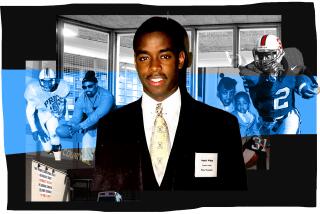Socialite’s Fiance Admitted Slaying, Court Told
- Share via
Richard D. Wilson, the San Francisco tax accountant charged with killing a man accused of beating Wilson’s fiancee to death, told an attorney that he had committed the slaying, a key prosecution witness testified Friday.
But on cross-examination, the witness--Robert Clinton Hale, Wilson’s brother-in-law--conceded that he had been undergoing severe psychiatric problems last year--when he said the meeting with the attorney took place--and that “I think I fantasized a lot of things.”
Wilson’s fiancee, San Francisco socialite Joan McShane Mills, 33, died in 1983 after being found nude and battered in her Beverly Hills hotel room.
The man found standing over her--Jeffrey Malloy Parker, then 37, an unemployed printing salesman--said he had only tried to resuscitate her after she collapsed during a night of drinking, drugs and sex.
Parker was charged with Mills’ murder but was fatally shot on his mother’s front porch in Costa Mesa on the night before his preliminary hearing.
Hale, testifying under immunity from prosecution during Wilson’s preliminary hearing in Harbor Municipal Court, has recanted some of the statements he had made earlier this year before the Orange County Grand Jury, which indicted Wilson on a charge of murder.
But over objections from defense attorney Joel W. Baruch, Hale testified Friday that within a month of Parker’s murder, Wilson called him to San Francisco and drove him to an attorney’s house, where they discussed the Parker slaying in Hale’s presence.
Wilson “said that he’d shot him,” Hale testified Friday.
According to Hale, the attorney--who was not identified during the testimony--turned to Hale and asked, “Did he (Wilson) do it?” and Hale replied, “He said he did.”
Hale repeatedly denied making the anonymous telephone call to Costa Mesa police in March, 1986, that reopened the case and eventually resulted in Wilson’s indictment. The anonymous caller had told detectives that Wilson was the murderer and gave details of the crime, according to investigators. Police said they traced the call to Hale’s home telephone.
Deputy Dist. Atty. Douglas H. Woodsmall, referring to reports of police interviews with Hale, asked whether Hale had ever said that Wilson would kill him if he found out that Hale had made the telephone call.
“Probably I said that, but I don’t recall,” Hale testified.
He later conceded that “very possibly” he felt he would be killed if he was identified as the caller.
Under cross-examination, Hale said that during much of 1986, when the investigation was under way, his psychiatric problems caused him to “fantasize.”
He said he accused his wife of things he now knows she didn’t do and one morning awoke convinced that he had been in a traffic accident, even though his truck showed no damage.
“Everything’s running together in my mind of what I’ve read, seen on TV (about the Parker murder),” Hale said.
Hale’s testimony will continue Monday when the hearing is scheduled to resume.
More to Read
Sign up for Essential California
The most important California stories and recommendations in your inbox every morning.
You may occasionally receive promotional content from the Los Angeles Times.









